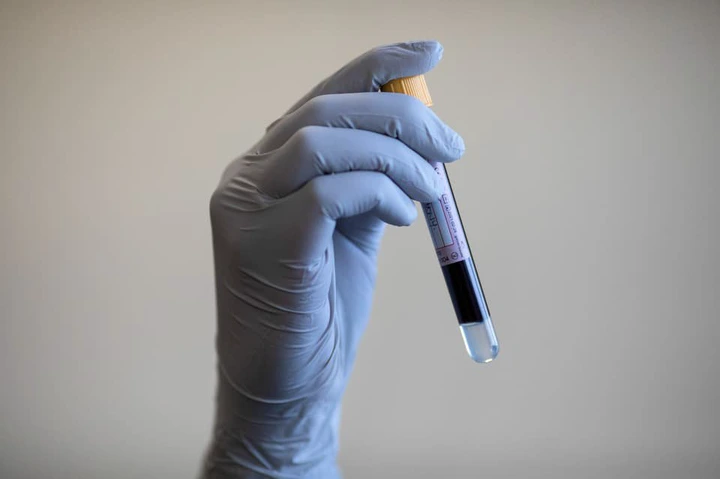
View pictures in App save up to 80% data.
This month, the UK will launch the largest study ever conducted on proteins found in the human body. The research aims to understand the development of diseases and to create straightforward blood tests that could identify conditions such as cancer and dementia years ahead of a doctor's diagnosis.
The UK Biobank Pharma Proteomics Project could be a “crucial piece in the jigsaw puzzle for scientists”, experts suggest, with the potential to transform healthcare by the end of the decade.
This will enable scientists to investigate how genetics, lifestyle choices, and environmental factors contribute to diseases by analyzing variations in protein concentrations in the bloodstream.
There is potential for the development of blood tests that can diagnose autoimmune disorders like multiple sclerosis and Crohn’s disease with greater speed and precision.
There is a strong possibility that we could create straightforward blood tests capable of identifying diseases at much earlier stages than what is currently available.
Professor Naomi Allen, affiliated with the UK Biobank
Proteomics involves the extensive examination of proteins, focusing on their involvement in diseases and the ways in which their structure and function contribute to the development of illnesses.
This innovative initiative builds upon a groundbreaking pilot program that released findings on nearly 3,000 proteins derived from blood samples of 54,000 participants in the UK Biobank.
The preliminary data has enabled researchers to detect increased protein levels in individuals who may develop dementia as much as ten years prior to diagnosis, and up to seven years ahead of certain cancer diagnoses.
Professor Sir Rory Collins, the principal investigator and CEO of UK Biobank, stated: "The information gathered in this study will enable researchers globally to pursue health-related investigations, examining how factors such as lifestyle, environment, and genetics influence the production of proteins, which may cause certain individuals to develop specific diseases while others remain unaffected."
"This will enable us to pinpoint individuals who are at a higher risk of developing diseases long before symptoms appear, allowing us to explore preventative measures to avert these conditions from manifesting."
The expanded initiative, supported by a coalition of 14 pharmaceutical companies, seeks to analyze as many as 5,400 proteins from a total of 600,000 blood samples.
Accessing information on protein levels enhances our understanding of how genes, lifestyle choices, and environmental factors contribute to disease by influencing protein alterations.
Professor Naomi Allen, affiliated with the UK Biobank
This encompasses samples collected 15 to 20 years ago, marking the initiation of the UK Biobank study, involving 500,000 individuals aged from their early 40s to late 60s. Additionally, follow-up samples were gathered from 100,000 UK Biobank participants 10 to 15 years subsequently.
Professor Naomi Allen, the leading scientist at UK Biobank, remarked: “This is incredibly significant, as it will allow researchers to understand how fluctuations in protein levels in individuals during mid to late life impact the onset of various diseases.”
"It will speed up investigations into the origins of illnesses and the creation of novel therapies aimed at specific proteins linked to those conditions."
Speaking of the pilot, Prof Allen added: “Accessing information on protein levels enhances our understanding of how genes, lifestyle choices, and environmental factors contribute to disease by influencing protein alterations..
"This provides an essential component for researchers to understand the progression of diseases, offering solid insights into potential prevention and treatment strategies."
"Preliminary data indicates that certain proteins are significantly increased in individuals who eventually develop various forms of cancer, with this elevation occurring as much as seven years prior to an official diagnosis. Similarly, for dementia, these changes can be detected up to ten years before a clinical diagnosis is established."
“There is a strong possibility that we could create straightforward blood tests capable of identifying diseases at much earlier stages than what is currently available..
"For instance, consider dementia: if we could develop a blood test that detects certain proteins known to be elevated in individuals at risk of developing Alzheimer’s disease, those individuals could take advantage of new medications available that are tailored to treat the disease in its early stages."

View pictures in App save up to 80% data.
It is also conceivable that blood tests could be developed to identify autoimmune disorders (PA).
PA News Agency
"Findings from the pilot study indicate that certain proteins are significantly increased in people suffering from autoimmune disorders such as multiple sclerosis and Crohn's disease, among others."
"This illustrates how a straightforward blood test can enhance current diagnostic methods, leading to a more precise and potentially faster diagnosis of these diseases."
Professor Allen mentioned that findings from the pilot study have revealed that certain medications can be repurposed for the treatment of different medical conditions.
"She noted that certain proteins crucial for immune function are associated with the onset of various psychiatric disorders, including schizophrenia, depression, and bipolar disorder, among others."
"Considering that there are already medications designed to specifically target certain proteins associated with other health issues, this creates a significant opportunity to repurpose those existing drugs for treating neuropsychiatric disorders."
"Similar findings have been observed with certain chemotherapy medications, where proteins linked to particular cancers correspond to established chemotherapy treatments utilized for different types of cancer."
It is understood tens of millions of pounds in investment is being provided by the group of pharma firms, which includes the likes of Johnson & Johnson, AstraZeneca, Pfizer and GSK.
The funding will first aid scientists in assessing protein levels from 300,000 samples, a process anticipated to last around 12 months. The resulting data will be accessible to researchers approved by the UK Biobank in phased releases starting in 2026.
The information will be extremely useful. The worth of the information knows no bounds.
Professor Sir Rory Collins, associated with the UK Biobank
Dr Chris Whelan, director of neuroscience, data science and digital health at Johnson & Johnson innovative medicine and Pharma Proteomics Project lead, said: “We’re hoping, as further groups see the value of this project, that we will get funding to do all 600,000 and I’m quite confident that we will reach that goal.”
The complete dataset is anticipated to be incorporated into the UK Biobank Research Analysis Platform by the year 2027.
Dr. Whelan remarked, "I expect that by the close of this decade, we will witness significant changes in healthcare and the processes involved in drug development."
Sir Rory said: “The information will be extremely useful. The worth of the information knows no bounds..”
Dr. Whelan also mentioned that technology has facilitated the growth of the project.
"According to Dr. Whelan, they have now enabled us to perform proteomics on 600,000 samples within a timeframe comparable to that of the pilot project, although this will be achieved at a reduced cost and with lower efficiency."
"Much of this progress is driven by developments in robotics. This time, we plan to implement cutting-edge robotics, which will result in improved efficiency, quicker turnaround times, and reduced likelihood of human mistakes."
He remarked that certain researchers are also “integrating advanced artificial intelligence with proteomic information to create innovative disease prediction tests,” which includes blood tests for intricate conditions like dementia.
Science minister Lord Patrick Vallance hailed the plan as having the “potential to unlock a new era of possibilities”.










